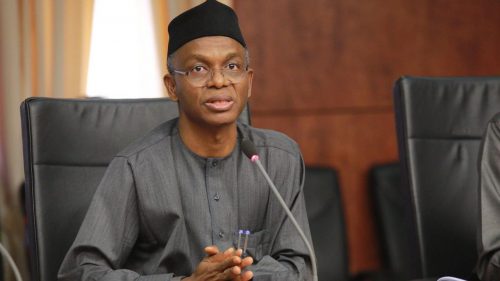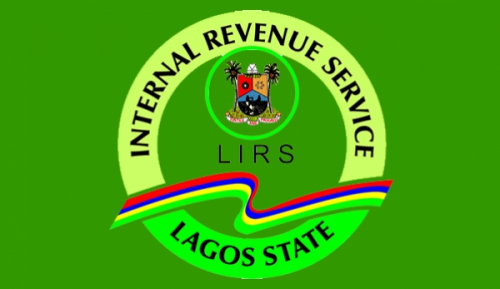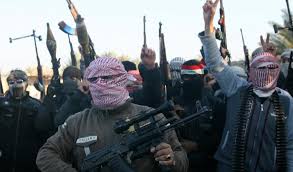Lawyers, actvists seeks Tinubu’s intervention over Wike’s remarks on Ijaw nation

By Ukpono Ukpong
Human rights lawyers and political activists have urge President Bola Tinubu to intervene after FCT Minister Nyesom Wike’s controversial remarks on the Ijaw nation.
The lawyers are also demanding an immediate apology from Wike, citing concerns about ethnic representation, constitutional rights, and national unity.
The controversy began when Wike referred to the Ijaw people as a “minority” and linked them to criminal activities. His comments have sparked fears that such statements could deepen ethnic tensions and contribute to marginalization narratives in Nigeria.
At a press conference held in Abuja, prominent legal and civil rights advocates strongly condemned the Minister’s remarks and called for urgent corrective action.
The event was attended by Barrister Deji Adeyanju, a human rights lawyer; Barrister Maxwell Opara, a constitutional lawyer; Barrister Marshal Abubakar, a legal analyst; and Comrade Chinedu Obasi, a former President of the National Association of Nigerian Students (NANS).
Each speaker at the event outlined the potential consequences of Wike’s statements, emphasizing the need for national leaders to be sensitive to ethnic issues.
They warned that failure to address the matter could lead to unnecessary political and social unrest.
Barrister Deji Adeyanju, speaking at the event, rejected Wike’s characterization of the Ijaw people as a minority, highlighting their historical and political influence in Nigeria.
“The Ijaw nation is one of the most prominent ethnic groups in Nigeria, with a long history of contributing to national development. They have played a vital role in the struggle for justice, resource control, and the protection of the Niger Delta environment. Any suggestion that they are a marginalised minority does not align with historical and demographic facts,” Adeyanju stated.
He further elaborated on the geographical spread of the Ijaw people across multiple states in the Niger Delta, asserting that their influence extends far beyond being considered a “minority.”
“In Rivers State alone, the Ijaw people are found in 12 local government areas. In Bayelsa, all eight local government areas are Ijaw. They also have a significant presence in Delta, Edo, Akwa Ibom, and Ondo states. Their contributions to the development of these regions and to Nigeria as a whole cannot be overlooked,” he added.
Adeyanju also referenced the Ijaw people’s longstanding struggle for economic justice, particularly their role in securing resource control policies that benefit the Niger Delta.
“The Ijaw struggle has been instrumental in securing key policies, such as the 13% derivation revenue for oil-producing states. Their advocacy for environmental protection and equitable resource distribution has shaped national discourse for decades,” he explained.
Barrister Maxwell Opara took a firmer stance, calling for immediate presidential intervention. He warned that allowing Wike’s comments to go unchallenged could create further ethnic tensions.
“It is crucial for the leadership of this country to step in. When concerns of ethnic misrepresentation arise, timely intervention helps to maintain peace and unity. The Ijaw people have demonstrated commendable restraint, but failing to resolve this issue could create unnecessary tensions,” Opara remarked.
He also noted that the issue had gained international attention, with Ijaw communities in the diaspora expressing concerns over Wike’s remarks.
“This is not merely a regional matter. The Ijaw people have a strong global presence, and their voices are being heard beyond Nigeria. We have seen reactions from their communities in the US, Europe, and Asia. Addressing this issue now is vital to preventing further misunderstandings,” he said.
Legal analyst Barrister Marshal Abubakar examined the constitutional implications of Wike’s statements, arguing that they contradict Nigeria’s legal framework and international human rights standards.
“Nigeria’s Constitution upholds equality and prohibits discrimination. Section 42 of the 1999 Constitution guarantees the right of every ethnic group to fair recognition and protection. The African Charter on Human and Peoples’ Rights, to which Nigeria is a signatory, also reinforces this principle,” he explained.
Abubakar urged public officials to be mindful of their statements, cautioning that divisive rhetoric could threaten national cohesion.
“Leaders must promote unity and inclusivity. It is essential that all ethnic groups feel equally valued in our national discourse. Remarks that appear to diminish any ethnic nationality must be addressed responsibly,” he said.
Former NANS President Comrade Chinedu Obasi highlighted the broader political implications, emphasizing that Wike’s remarks reflect on the government he serves.
“As a minister in the federal government, his words carry significant weight. The responsibility lies with the leadership to ensure that all ethnic groups are treated with the dignity they deserve,” Obasi asserted.
He further called on President Tinubu to take decisive action, warning that failing to do so could send the wrong message about the administration’s stance on ethnic unity.
“If an apology is not issued, it could be perceived as an endorsement of divisive rhetoric. That is why we are urging President Tinubu to intervene. A unified Nigeria is built on mutual respect among all ethnic groups,” he added.
Yahoo Mail – Email Simplified










